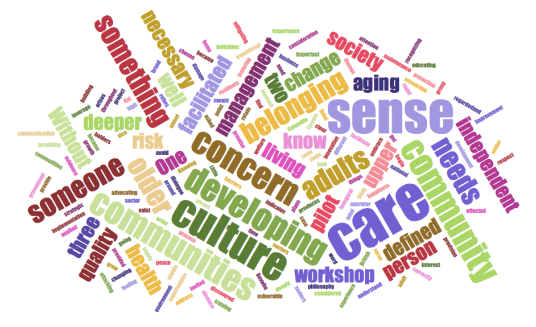|
Once upon a time there was a Kat and a Bev...who got invited to facilitate a pilot project with the upper management of a national independent living brand and operator. Little did they know, that they would become deeply involved in developing and advocating for a culture of care in community and community living sectors for aging adults.
So why Culture of Care? The Dalai Lama indicates that for us to find peace and happiness we need to have three things in our communities; a Sense of Care, a Sense of Concern and a Sense of Belonging. This was the premise of our inaugural workshop where we facilitated a dialogue around what each sense meant to middle and upper management of three independent communities in two different provinces; two in British Columbia and one in Toronto. We then asked what are unmet needs, the barriers to those and what, if any, opportunities exist for innovation or change. We discovered themes throughout each community that provided evidence and absence of a deeper community care philosophy. The business of this sector is to care for seniors and older adults. Older adults are going to experience change through aging and are considered highly vulnerable. Knowing this, it was important to encourage all stake holders to embrace a culture of care and begin the process of developing deeper strategic plans and implementation. We know our communities of care are being effected by a rapid and changing environment. We understand that developing a culture of care is a high leverage point for communities and commodities in order to attract, retain and grow as well as address the transitional needs. Care is defined as the provision of what is necessary for the health, welfare, maintenance, and protection of someone or something, with attention or consideration applied to doing something correctly or to avoid damage or risk. It refers to feeling concern or interest; attaching importance to something, to look after and provide for the needs of. Without a sense of care, there can not be a sense of belonging. Without a sense of care, there can not be a sense of concern. And vice versa. One thing became clear when we facilitated the very same pilot workshop with a group of residents, that a sense of belonging and recognizing that this was their 'chosen home' was preeminent. The word culture is defined as the quality in a person or society that arises from a concern for what is regarded...and the development or improvement of the mind through educating or training. So a culture of care, in our definition, is the quality in a person or society that is providing what is necessary for the health and well being of 'someone', in this case, 'someone' being an older adult or senior, through developing communication, building respect, mitigating risk and fostering growth. Leave a Reply. |
AuthorsBeverley Pomeroy ArchivesCategories |

 RSS Feed
RSS Feed
